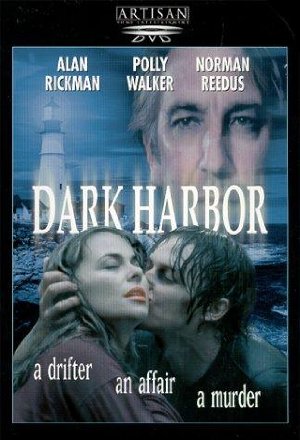Dark Harbor Review
By Jeremiah Kipp
David (Alan Rickman) and Alexis (Polly Walker) are suffering through an unhappy marriage where every look and gesture has fifteen shades of meaning, most of it tinted with frustration and hostility. Taking a page from Polanski's Cul-de-Sac, these characters are taking their vacation on a remote island off the coast of Maine.
En route to this retreat where they may rekindle the last coals of their deteriorating marriage, they discover a young, bedraggled stranger (Norman Reedus) on the side of the road. He appears to have been severely beaten, but refuses to accept their help if they call the police. Before long, he's been invited to join them at their home for the weekend and becomes a catalyst for the couple to express their true intentions toward each other.
The stilted, controlled dialogue clearly aspires to be Pinter-esque, but never really moves beyond the old mantra of characters who "are talking about one thing but really mean something else." This quickly becomes an obvious dramatic choice, and never moves beyond the superficial.
The thuddingly obvious notes hit by writer-director Adam Coleman Howard include a moment where David and Alexis are planning their evening with grim resolve. "What do you want?" Alexis demands.
"Oh, for dinner? Lobster." is David's curt non-response.
The characters continually shift around each other using their words as weapons or defense mechanisms, but never really move beyond the cipher characterizations of an unhappy couple and a non-emotive mystery man. Of course, as usually happens in a sexual thriller, Alexis falls for this man and gazes longingly at him when he rubs her back with lotion, much to the chagrin of David. Before long, David is going "off to play golf" while Alexis and the young man have the house all to themselves. Sensual thoughts are sure to follow, as is the notion of betrayal.
The deliberate pace of the film allows plenty of room for the characters to sit around and talk through their subterranean impulses. Alan Rickman and Polly Walker make for strong screen presences, and work their way through the clunky dialogue with grace and reserves of intensity. Norman Reedus isn't called on to do much more than be handsome and speak in a soft voice, but is appropriately sexy in an understated way.
Dark Harbor might have been rescued from its own absurdity by the rich acting trio, but it fumbles toward a twist ending which is screamingly lacking in common sense, centering on the trust between Alexis and her newfound friend. It also takes a few twists and turns reminiscent of The Usual Suspects or Wild Things. When did "things are not what they seem" become so painfully familiar?
The cinematography seems to favor the lush autumn and rich blues of coastal Maine, but the staging of action feels somewhat unclear much of the time. When the three characters are rushing through the woods in the grand finale, one is often confused (and not deliberately) as to exactly where people are in relationship to one another. This could also be because the script never allows us to make an emotional investment in these people, despite their handful of contrived monologues talking about happier days gone by.
Financed by Killer Films and Hart Sharp Productions, who also brought us the powerfully moving Boys Don't Cry, took a gamble with this one. It may have felt like an interesting story on paper, but Adam Coleman Howard delivers this meal overcooked and underlayered. Perhaps that explains why it took two years to be released on home video.

Facts and Figures
Year: 1999
Run time: 96 mins
In Theaters: Friday 31st December 1999
Distributed by: Artisan Entertainment
Production compaines: Killer Films
Reviews
Contactmusic.com: 2 / 5
IMDB: 6.1 / 10
Cast & Crew
Director: Adam Coleman Howard
Producer: John Hart, Jeff Sharp
Screenwriter: Adam Coleman Howard
Starring: Alan Rickman as David Weinberg, Polly Walker as Alexis Chandler Weinberg, Norman Reedus as Young Man, Janet Mecca as Alexis Sr., Lewis Flagg as Minister, Sasha Lazard as Funeral Singer
Also starring: John Hart, Jeff Sharp, Adam Coleman Howard














